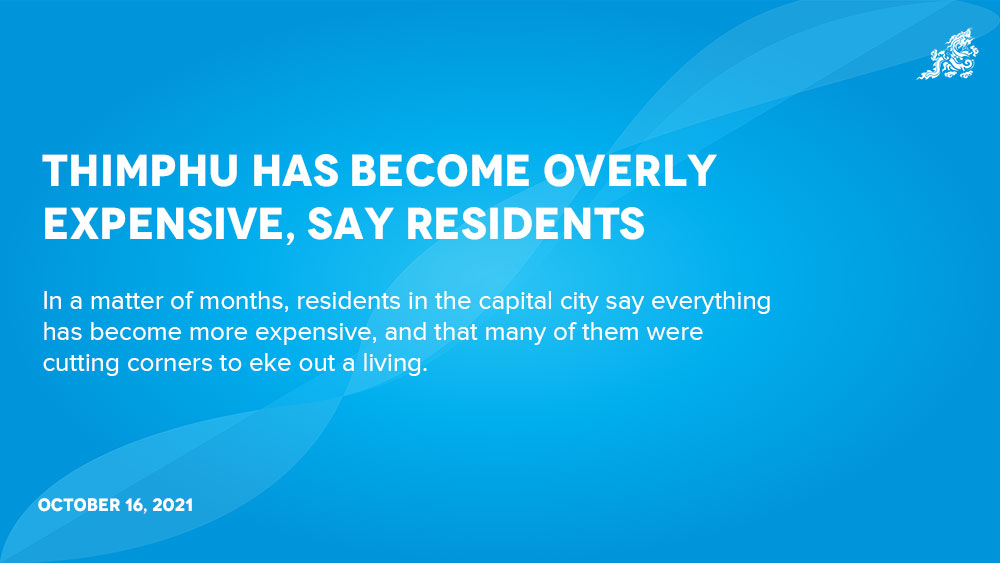Nima Wangdi
In a matter of months, residents in the capital city say everything has become more expensive, and that many of them were cutting corners to eke out a living.
Working at an eatery in Thimphu, Pasang earns Nu 8,000 a month. With a school-going daughter and an ailing mother to look after, her expenses exceed her income, forcing her to borrow from others to make ends meet.
She pays Nu 3,000 in house rent, which is 38 percent of her monthly income, and spends Nu 4,000 on groceries. She is left with only Nu 500 after paying for the utilities.
She says she can’t return to her village because her mother needs to visit the hospital frequently and she wants to send her daughter to a good school. “For low-income people like me, living in Thimphu is difficult but I don’t have many options,” she said.
There are many in Thimphu who, like Pasang, pay almost half their monthly salary in house rent. They say living in the city has become increasingly expensive over the years with house rents and prices of goods soaring rapidly.
A corporate employee, Tshering, said his father pays half the rent. He spends Nu 10,000 a month on groceries and then helps his siblings who go to school. “I manage to save Nu 1,000 a month at least, in case there are any emergencies in the family,” he said. He said he wouldn’t be able to survive in Thimphu on his salary if he had to live alone.
Another corporate employee, Karma, said the prices of commodities have increased recently. She cited an example: the price of a five-litre bottle of oil that used to cost Nu 750 has increased to Nu 1,200 today. She said it was more comfortable for families with two income earners.
Karma said she buys groceries on credit and pays at the end of the month. “My salary does not last for a week; forget about saving it,” she said. Another employee said he wished there were huts with cheaper rent to live in.
A civil servant, who lives alone, said the prices of goods have increased, even for vegetables. Eggs, beer, and fuel prices are prominent examples. He earns Nu 26,000 a month but cannot save any of it.
He has to help his siblings and also sends money to his parents in the village. “I can hardly save any money, as I have to buy groceries and fuel for my car,” he said. “Living in Thimphu is expensive.”
He said, going by the present rate of inflation, prices of commodities and house rents need close monitoring and regulation. “This could land us in serious trouble if authorities do not act now,” the civil servant said. “It is evident that some people are suffering while some take advantage of this pandemic.”
Langa, an employee of a private company, said that if pricing is not regulated starting now, there will come a time when young people will be forced to go overseas to work as they can’t survive in the country with what they earn.
Tshomo, 24, works for one of the financial institutions. She said the increase in rent is neglected as if it is no one’s responsibility. “Some house owners tend to increase rent beyond what is allowed, while some tenants are not at all aware of the Tenancy Act.”
A grocery shopkeeper in Taba said that the pricing of essential commodities has increased from the source, with increased transportation costs due to Covid-19 restrictions and protocols.
“The two-litre refined oil that we used to sell at Nu 125 has increased to Nu 280, which is more than twofold.” He said the prices of commodities are contingent on the increased fossil fuel prices.
The chief trade officer of the Office of Consumer Protection, Ministry of Economic Affairs, Gopal Pradhan, said that there has been a slight increase in commodity prices due to the pandemic but it’s being closely monitored in the market. “People lodge complaints on unfair trade practices, mostly on issues of overpricing, and we address them accordingly.”
In an earlier interview, a psychiatrist at Jigme Dorji Wangchuck National Referral hospital, Dr Damber K Nirola said that people not being able to get a job, or not earning enough even after getting a job, impacts them mentally.
Edited by Tshering Palden


